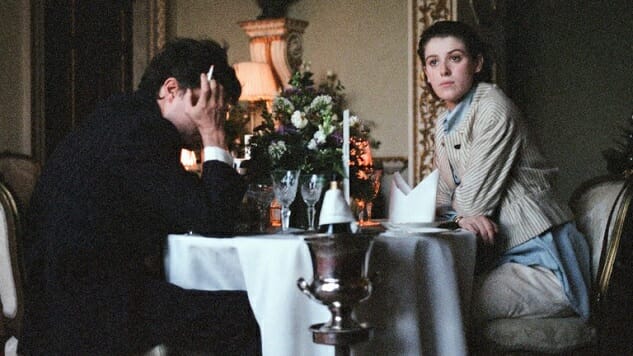The Souvenir

Movies, for one or two (or three) hours at a time, let audiences depart their reality and inhabit someone else’s. At worst, that departure amounts to escapism. At best, it allows viewers an opportunity to invest in empathy, which, as Roger Ebert famously noted, is what movies generate. In Joanna Hogg’s new film, The Souvenir, that dynamic cuts both ways.
Hogg’s work extends back to the mid-to-late 1980s, when she made her first short film, worked on BBC miniseries, and began directing TV shows. She started making feature movies in 2007 with Unrelated and somewhat steadily continued down that path with Archipelago (2010) and Exhibition (2013). Her latest film is perhaps her best to date, certainly her most personal, and without a doubt one of the year’s most remarkable releases so far.
Rooted in her experiences as an artist and based, in part, on entries in her own diary, the film settles into the perspective of Julie (Honor Swinton-Byrne), a demure film student in 1980s London prepping for her graduation project, a drama of working-class proportions ringing of kitchen sink realism à la Mike Leigh or Tony Richardson. The question of her credentials, and of whether she has either the right or the perspective to make a film about the hard lives led by Sunderland’s laborers, is raised early on and repeated throughout, both by her professors and her beau, Anthony (Tom Burke). Like Julie, Anthony is possessed of privilege, which makes his comments especially condescending: Who the hell is he to talk to her about privilege in the first place?
Admittedly, he has an occasional point, but while these points are made, the movie takes careful, quiet note that every voice critiquing Julie happens to be male. So it goes in a man’s field in a man’s world in the ’80s. Rather than seize on this imbalance to make an argument, Hogg instead lets it serve as fodder for reflection. Julie, acting as Hogg’s protagonist and her screen surrogate, routinely hangs around the film’s fringes, too shy a person and too devout an observer to insert herself into a scene or influence a conversation, and yes, too prototypically British as well. But all of this is in keeping with The Souvenir’s function as a document of Hogg’s life and with her style as a filmmaker. Timid women on paths of self-discovery recur throughout her filmography, most of all Unrelated, a heartbreaking movie that, much like The Souvenir, takes unexpected turns without telegraphing or forcing them.